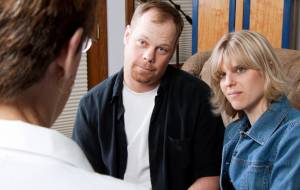
by Paul W. Anderson, Ph.D.
Questions about marriage counseling in Kansas City and Overland Park, KS deserve answers. Here are mine:
1. How do we know when to get therapy for our marriage?
When I learned to sail, the instructors would tell us the time to shorten sail so the stronger winds did not cause damage was when you first think of it. I think the same rule or guideline applies to seeking counseling for marriage.
Look for a “marriage counselor near me” on your phone or computer and select a couple of names. Give each one a call, talk with them about your relationship and see how that feels. You will know if it seems right to take the next step.
I also recommend discussing the possibility of marriage therapy with your partner before you go. They may or may not be onboard with the idea. The point is not to argue with them and run the risk of one more fight.
Instead, letting your mate or spouse know what you’re considering and that you want them to think about going with you to the counselor before you set up an appointment can prevent them feeling ambushed, caught off guard or left out of the decision making loop. You are not asking for their permission. You may go or not with or with out your spouse. The goal is to prevent secrecy and more misunderstandings.
2. What is the most difficult part of couples or marriage therapy?
Of all the questions about marriage counseling, this may be the most interesting one. Different marriage counselors answer will answer differently based upon their own experience and orientation. I think picking up the phone to call and make an appointment is often the hardest thing to do. Statistically, a couple waits up to six months from the time they begin to think about using relationship counseling until they make a call to set up an appointment.
This is not to say that the process of marriage counseling is always easy. But once the first step is  taken, if you have an open mind about the counseling process, trust in your therapist will come and positive results begin to happen.
taken, if you have an open mind about the counseling process, trust in your therapist will come and positive results begin to happen.
To some extent, marriage/couple counseling has aspects of life coaching. It’s not likely that a marriage will improve if the life style and quality of life of the couple does not also get better. So, at times couples find themselves addressing issues that affect their marriage, such as drinking problems, financial issues or legal and medical concerns.
3. How many sessions will couples counseling/coaching take?
There is no standard answer to this question about couples therapy. I recommend that couples be ready to put effort into the process and devote time and focus to their marriage for up to six months. This does not mean you would be coming into counseling regularly for that time. You may need counseling once a week to get things started, then enter a period where you come every second or third week and then perhaps eventually only as needed.
To a large extent, the amount of counseling a relationship needs depends on the amount of conflict and anxiety the couples struggles with. Often, much of this anxiety is due to negative circumstances in the couple’s life which puts strain on the marriage. .
It’s not the number of sessions that helps a marriage get better and improve but rather the effort and work a couple does on their relationship between counseling sessions. Does the couple use and practice the new ideas and patterns the therapist suggests or is there resistance to the homework assignments? Having said that, most couples will use between 10 and 20 sessions during the first six months of counseling.
4. How long will it take us to feel better with each other?
Marri age counseling, like physical training, requires some sweat. Depending upon the marriage, and the couple’s willingness to explore new ideas and practice interpersonal skills, progress comes sooner or later. I continually monitor the progress you make as a couple and give you my observations and suggestions. With that, goals for the relationship are mutually decided upon.
age counseling, like physical training, requires some sweat. Depending upon the marriage, and the couple’s willingness to explore new ideas and practice interpersonal skills, progress comes sooner or later. I continually monitor the progress you make as a couple and give you my observations and suggestions. With that, goals for the relationship are mutually decided upon.
5. Do you offer a free consultation to get acquainted with your style and see if you can help our marriage?
I have found that an initial conversation or two over the phone to answer your questions and share my thoughts about my approach to marriage counseling can be very helpful to couple trying to make a choice of counselors.
The best way to see if I can be of help to your relationship is to watch me work rather than talk about how he I work. If I’m working with you and your partner, part of that requires your involvement including paying for my services. Within 2 to 3 sessions with me you should begin to see progress and be able to tell if we have a good fit.
6. How do we prepare for couples therapy?
When you are ready to begin, make a first appointment and show up at my office. From there, as I gather more information about you as persons and how your relationship functions, I will give you suggestions, homework assignments and new ideas to consider and use as you do your marriage or relationship.
Asking these kind of questions about marriage counseling and getting answers is a great preparation for marital therapy.
If you hire a personal physical trainer, the gains you make will depend upon how closely you follow your trainer’s directions and the extent to which you work to implementing those directions. The old adage, “no pain no gain” suggests that you will get as much out of relationship counseling as you put into it applying your coach’s suggestions between sessions.
Come prepared with an open mind, trust your counselor and do the best you can to try out new ways of thinking. Be willing to practice the communication and interpersonal skills your coach or counselor recommends.
7. How Can I Get My Husband To Go To Marriage Counseling?
If you want to go to marriage counseling with your reluctant partner, it’s best to start with a statement rather than a question. Say to your husband (or partner), “I have located a marriage counselor I want to visit and see if they can help me (not us) do better in my marriage. My dear spouse, I’m inviting you to go with me and I hope you will attend this first session with me. Here are the specifics (time, person, and place). If there is anything I can do or say to help you decide, please let me know. But, I intend to go with or without you.”
The next thing to tell you husband is the reason(s) you want him to come with you. What are you trying to accomplish by asking your partner into marriage counseling? Sample reasons may include;
- improve our understanding of each other regarding a specific issue,
- learn better problem solving skills or
- find ways to break up the boredom in our marriage.
If you can get clear in your own mind your motivations or intentions for going to marriage counseling, that’s where I would suggest you start when you open up the dialogue with your partner, “Will you go to marriage counseling with me?”
Usually, there is a reason or desire we have when we ask our partner to do anything with us, such as: “Will you make love with me? “Will you go to the grocery store with me?” “Will you go to church with me?” “Will you go with me to see my family?”
What is it you want to accomplish when you ask your partner to do anything specific with you? Those reasons need to be added to the invitation, like this: “Will you make love with me so we can be close and feel good about each other?” “Will you go the grocery store with me because my back hurts and I can’t carry the big sack of dog food?” “Will you go to marriage counseling with me so you won’t think I’m complaining about you to the counselor behind your back? Going with me will help me feel like you are with me on improving our marriage, even if you sit there silent and I do all the talking.”
Behind each invitation a partner gives to the other one, there are reasons for the invitation. Spelling out those reasons gives your partner more information upon which to make a decision. Your request may be denied, granted or postponed. But, you have done your part to be open by stating your intentions. That way, there are no hidden agendas and your husband/partner does not have to feel suspicious about what you are up to.
If your partner wants to discuss the matter, be willing to do that including giving your reasons or intentions for going to marital therapy. However, there is no need to argue about it. An invitation is just that. It is not a debate or an attempt to control your loved one.
Don’t mention it again, but by all means continue what you started and keep the appointment you made with a marriage counselor. Later on, and perhaps with suggestions from your counselor, you can talk again with your partner about other things besides marriage counseling the two of you can do together to enhance the marriage. Counseling isn’t for everyone and marriage counseling is not the only way to make a marriage better.
It is fair to say that in my practice I have seen marriage counseling with one partner work to benefit the marriage as much as I have seen conjoint counseling (when both partners go together) help marriages. However, not all marriage counselors know how to help a marriage with only one partner present, so pick your therapist carefully.
8. What, if any, is the impact of addiction on a marriage?
As an addictions specialist and a licensed addictions clinical counselor, trust me: the impact is huge. That is not to say that a marriage can not survive the disease of substance abuse or another form of addiction. Marriage can make it through to healing and recovery, but not with out help.
Think of any life threatening disease, cancer, diabetics, heart disease for example. Those do have a significant effect on a marriage or intimate relationship. The hope comes when the couple reaches out for guidance and assistance.
9. What, Dr. Anderson, is your approach to couples counseling and marriage therapy?
Here’s the bottom line on my approach. The last reason you want your partner to go to marriage counseling is because you believe things in the marriage will not get better unless you both change.
That is a myth. If only one of the partners in a relationship changes and improves their emotional functioning, that’s half the battle and the marriage will be 50% better.
Certainly, if both partners are willing to work together on anything, marriage or a garden in the backyard, there are advantages. But, if you want to garden, go garden. Whatever gardening you do by yourself will be more than no gardening at all. The same applies to marriage counseling.
If indeed you think changes need to be made in the marriage, be willing to lead by example and not get locked into a false belief that says I have to change him/her before things will be better. More likely than not, that attitude will perpetuate the status quo of gridlock and power struggles in your marriage. And that’s not much fun.
10. What happens in the first few sessions of family or relationship counseling?
The first session is devoted to gathering information about you as a couple and your concerns. I want to hear about what is going on in the marriage or relationship of concern. If more than one person comes to the first session, I want to give equal opportunity to each person to discuss their perspective on the issue(s) and to feel heard and understood by me.
By the second or third session, I usually have enough history of your relationship, the current problem and how that ties into the marriage in general to establish a foundation and framework for proceeding to the problem solving phase. I discuss with you and your partner a strategic plan of action and behavioral change that is designed to make thing better. This will include assignments and “homework” suggestions the couple can work on between sessions.
Your work with me will included subsequent sessions where the results of new behaviors are discussed, new relationship skills introduced and practiced and other complications which may have developed addressed.

With the help of your marriage counselor, if you get busy doing your part to do all you can to be the best partner you can be, chances are, things will take care of themselves and you won’t have to ask, “How can I get my husband to go to marriage counseling?”
To discuss more of your questions about marriage counseling, please call me, Paul W. Anderson, PhD – 913-991-2302.
